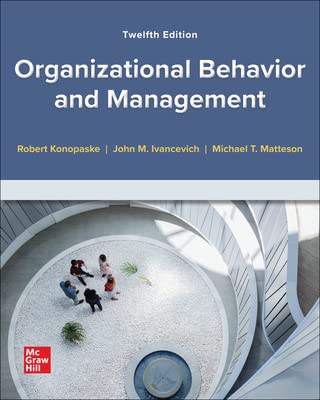This activity is a superlative exercise for illustrating the highly complex and often intense dynamics between two
Question:
This activity is a superlative exercise for illustrating the highly complex and often intense dynamics between two groups when:
1. Both teams are striving to outperform the other
2. The temptation to surprise (and deceive) the other team is great because if successful, deceit can be highly profitable in the exercise.
3. Teams as a result often do deceive each other which results in some highly interesting subsequent intragroup and intergroup dynamics.
Some suggestions for conducting the exercise:
1. Use index cards (bold black X marked on one side) for the 20 cards provided to each team.
2. If two groups are created, conduct the exercise in a room large enough so that each team cannot hear the other's deliberations (keep an eye on team members to ensure that no spying occurs). Better yet, assign the teams to separate rooms (this is surely necessary if you are using more than two teams).
3. Appoint a student as referee banker who will keep track of the financial transactions for the teams.
4. Assign the exercise as a reading assignment so that students will be thoroughly familiar with the exercise before the activity begins.
5. Provide each team with a copy of the attached World Bank Record Sheet so members can keep track of their moves and results.
6. It is useful to allow the teams three minutes for the first three moves to better enable them to "get a feel" for the exercise.
7. Strictly enforce the 2.5-minute time length for periods. Two rounds usually provide an insightful exercise.
In conducting post-exercise discussion, pose the following questions to the teams:
1. What initial strategy did your team develop? Most teams usually begin with a non-aggressive strategy with no initial plan to attack. However, often this strategy will break down either because the team will be attacked or because it will succumb to the temptation of potential higher profits via surprise attack. Once an attack occurs, an arms buildup usually results (and if it continues, both teams will pay a high price). If an attack is launched by a team that previously promised not to attack, the mutual arms buildup is even more intense and intergroup communications tend to break down.
2. What factors influenced your position concerning negotiations?
3. Was your team attacked? How did the attack affect your subsequent strategy and your negotiations with the opposing team?
4. How did the two-minute limit on your team's decision moves influence team decision making?
5. What role does trust play in this exercise?
6. What were your emotions as team members during the activity? (Many students will cite great frustration.) Why was frustration so high?
Step by Step Answer:

Organizational Behavior And Management
ISBN: 9781265280741
12th Edition
Authors: Robert Konopaske , John Ivancevich , Michael Matteson





